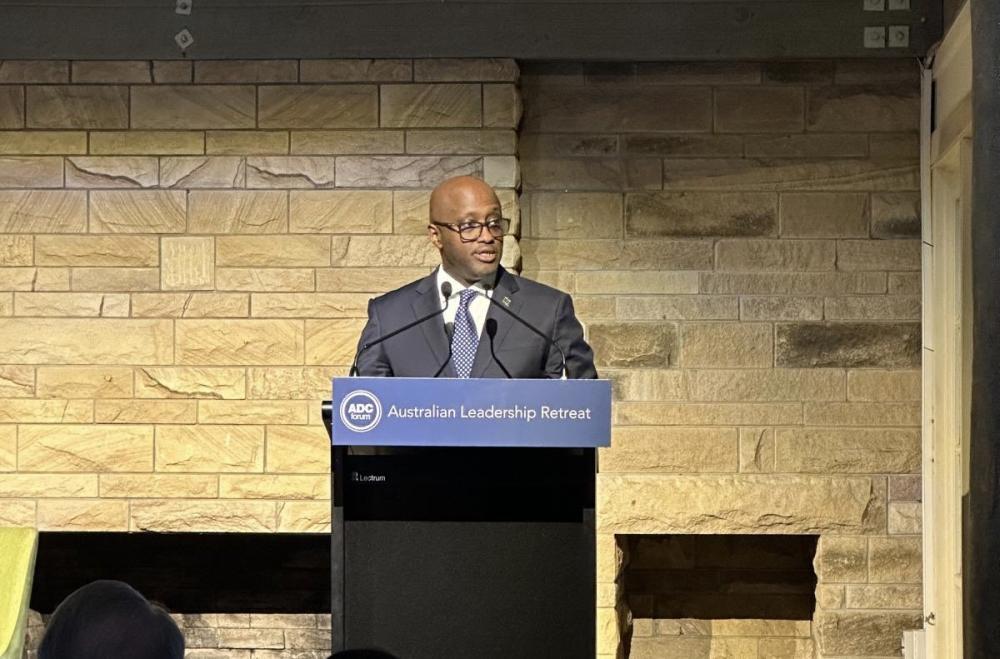Africa-Press – Rwanda. Foreign affairs minister Olivier Nduhungirehe has stressed that true progress must be shaped by a country’s own realities, values, and vision, not by templates imposed from outside.
He was speaking at the Australian Leadership Retreat in Brisbane, as part of his official visit to Australia which began on Thursday, August 14. The retreat brought together leaders from government, business, and civil society focusing on strategic opportunities and partnerships.
“Whether in Africa, here in Australia, or anywhere else, development should never be about fitting into a frame designed elsewhere,” he said. “It should be rooted in values, driven by pragmatism, and flexible enough to adapt to an ever-changing world.”
Responding to a question on how Rwanda has applied a strategic approach to developing home-grown solutions, Nduhungirehe said the country’s journey offers lessons on the power, and difficulty, of building institutions that fit local contexts.
“Rwanda’s story is proof that building institutions and solutions that fit context is hard. It requires patience, resilience, and sometimes taking the more difficult path,” he said. “But the return on investment is worth it. In our case, it translated into restored unity, socio-economic progress, and a sense of ownership among citizens.”
Nduhungirehe began by tracing Rwanda’s history, noting that the nation-state predates colonialism by centuries and was once a well-structured society guided by its own laws, cultural codes, and values.
The arrival of German, and later Belgian, colonizers introduced foreign systems and ideologies that eroded Rwanda’s social fabric. Using a “divide and rule” strategy, Belgian authorities transformed socio-economic groups into rigid ethnic identities, Hutu, Tutsi, and Twa ,and dismantled traditional governance structures.
By independence in 1962, Rwanda was left in political turmoil. An apartheid-like regime marginalized the Tutsi, denying them access to education, public service, and other rights. This institutionalized discrimination, compounded by periodic violence and mass displacement, laid the groundwork for the 1994 Genocide against the Tutsi.
“In April 1994, extremists set in motion a ‘final solution’ to kill every Tutsi in Rwanda,” Nduhungirehe recounted. “It is only in July 1994 that the forces of the Rwandan Patriotic Army put an end to the genocide, but not before a million Rwandans lost their lives.”
He told them how after 1994, Rwanda was devastated, with no money to rebuild, destroyed institutions, and deep national trauma. But Rwandans made three defining choices: to stay together, to be accountable, and to think big.
This approach informed Vision 2020, launched in 2000, which aimed to transform Rwanda into a knowledge-based, middle-income economy. Millions were lifted out of poverty, universal healthcare was introduced, and primary education was made free.
“We quickly understood that development was not a one-size-fits-all model. With modest means, Rwanda reformed its institutions and reorganized itself to do more, be more, and have more in the future,” he said.
Nduhungirehe also told them about how some solutions were born out of necessity. Gacaca community courts, for example, enabled the prosecution of nearly two million genocide-related cases within a decade.
Among others, he tipped them on Umuganda, a monthly community service day where citizens work together on public projects such as litter clean-up, tree planting, and building homes for vulnerable families.
For More News And Analysis About Rwanda Follow Africa-Press






